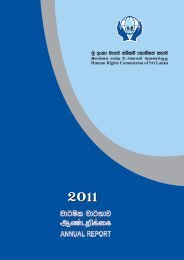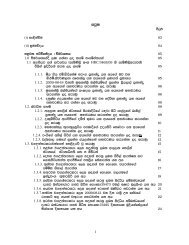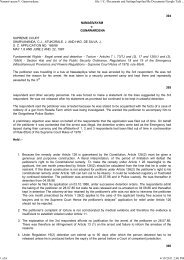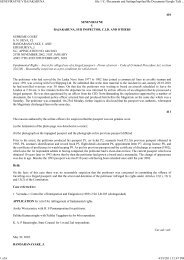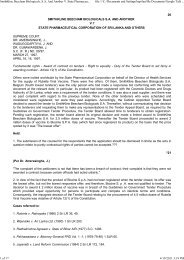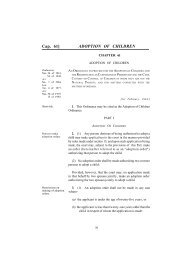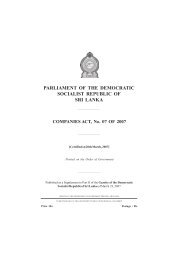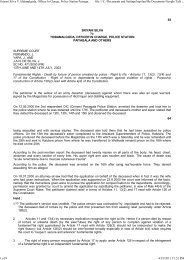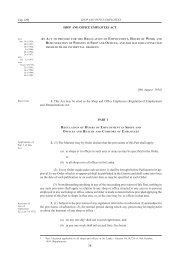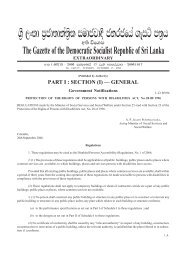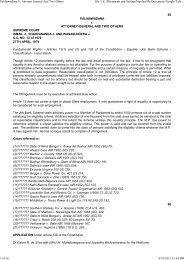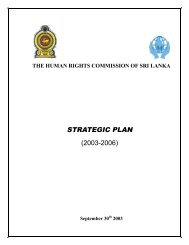Gamini Dissanayake (Petitio... - Human Rights Commission of Sri ...
Gamini Dissanayake (Petitio... - Human Rights Commission of Sri ...
Gamini Dissanayake (Petitio... - Human Rights Commission of Sri ...
Create successful ePaper yourself
Turn your PDF publications into a flip-book with our unique Google optimized e-Paper software.
<strong>Gamini</strong> <strong>Dissanayake</strong> (<strong>Petitio</strong>ner In Sc 4/91) V. Kaleel, M.C.M. And Others file:///C:/Documents and Settings/kapilan/My Documents/Google Talk ...<br />
181<br />
".......... what comes for determination is sometimes a matter to be settled by discretion, involving no law. It<br />
will, I suppose, usually be <strong>of</strong> an administrative kind ; but sometimes it will involve matter <strong>of</strong> law as well as matter <strong>of</strong><br />
fact, or even depend upon matter <strong>of</strong> law alone. In such cases the Board <strong>of</strong> Education will have to ascertain the law<br />
and also to ascertain the facts. I need not add that in doing either they must act in good faith and listen fairly to both<br />
sides, for that is a duty lying upon every one who decides anything .........."<br />
Ridge v. Baldwin settled that question. Lord Reid explained how the mere fact that the power affects rights<br />
or interests makes natural justice applicable to its exercise, and re-affirmed the older authorities which clearly<br />
showed how the courts engrafted the principles <strong>of</strong> natural justice on to a host <strong>of</strong> provisions authorising administrative<br />
interference with private rights. Lord Hodson was explicit :<br />
".........the answer in a given case is not provided by the statement that the giver <strong>of</strong> the decision is acting in<br />
an executive or administrative capacity as if that were the antithesis <strong>of</strong> a judicial capacity. The cases seem to me to<br />
show that persons acting in a capacity which is not on the face <strong>of</strong> it judicial but rather executive or administrative<br />
have been held by the courts to be subject to the principles <strong>of</strong> natural justice." (at p. 130)<br />
These views were later affirmed in no uncertain terms. Lord Denning, M.R., observed (in R v. Gaming<br />
Board for G.B. (26) that the heresy that the principles <strong>of</strong> natural justice only apply to judicial proceedings, and not to<br />
administrative proceedings, was scotched in Ridge v. Baldwin. In Schmidt v. Home Secretary (27) , he held that an<br />
administrative body may be bound to give a person who is affected by its decision an opportunity <strong>of</strong> making<br />
representations, if he has some right or interest, or even some legitimate expectation, <strong>of</strong> which it would not be fair to<br />
deprive him without hearing what he has to say. Lord Diplock (in A.G. v. Ryan (28) ) held that a person having legal<br />
authority to determine a question affecting the rights <strong>of</strong> individuals is, by necessary implication, required to observe<br />
the principles <strong>of</strong> natural justice when exercising that authority, and that if he fails to do so, his purported decision is a<br />
nullity.<br />
A decision made by an unbiased tribunal, after duly considering the views <strong>of</strong> those likely to be affected by it,<br />
is not only more likely to be correct, but will be more acceptable and <strong>of</strong> better quality. Fairness to the individual<br />
facilitates a better decision by the tribunal. The duty to give a fair hearing is as much a canon <strong>of</strong> good administration<br />
as <strong>of</strong> good legal or judicial procedure.<br />
Thus today natural justice controls the exercise not only <strong>of</strong> judicial power but <strong>of</strong> practically all powers and<br />
discretions. In public law areas, it applies to powers conferred by statute relating to property, <strong>of</strong>fice or status (e.g.<br />
to demolish buildings ; Cooper v. Wandsworth ; Urban Housing Co. v. Oxford City Council, to dismiss a public <strong>of</strong>ficer<br />
Ridge v. Baldwin ; Cooper v. Wilsom (29) ; Kanda v. Federation <strong>of</strong> Malaya (30) , Chief Constable (North Wales) v.<br />
Evans (31) ), but not in respect <strong>of</strong> an <strong>of</strong>fice held " at pleasure ", where dismissal without cause being assigned is<br />
authorised, or where the relationship is simply that <strong>of</strong> " master and servant " : Ridge v. Baldwin ; cf. Vidyodaya<br />
University v. Silva (32) ; to register an applicant for citizenship : A.G. v. Ryan; to dissolve a local authority ;<br />
Durayappah v. Fernando (33) , to make zoning orders regulating the supply <strong>of</strong> dairy products: Jeffs v. N.Z. Dairy<br />
Products (etc) Board (34), to suspend or dismiss registered dock workers : Barnard v. National Dock Labour Board<br />
(35) , cf. Vine v. National Dock Labour Board (36). Natural justice applies in many other areas, such as membership<br />
and <strong>of</strong>fice in trade unions (Lawlor v. Union <strong>of</strong> Post Office Workers (3 Burn v. National Amalgamated Labourers Union<br />
(38) , Abbott v. Sullivan (39) , Lee v. Showmen's Guild (40) , Taylor v. National Union <strong>of</strong> Seamen (41) , Annamunthodo v.<br />
Oilfield Workers Trust Union (42) , Stevenson v. United Road Transport Union (43) ), societies (Wood v. Woad, at p.<br />
196 ; Byrne v. Kinematograph Renters Society Ltd; Innes v. Wylie (44) , (Andrews v. Milchell (45) ), social clubs<br />
(Fisher v. Keane (46) , Labouchere v. Wharncliffe (47) , Dawkins v. Antrobus (48) , Gray v. Allison (49) ), and other private<br />
associations : (R v. Saddlers' Company, ex. p. Dinsdale (50) , Johnson v. Jockey Club <strong>of</strong> South Africa (51) , DArcy v.<br />
Adamson (52) , Graham v. Sinclair (53,) . Although the rights in question arose essentially from contract, a fair hearing<br />
was a pre-condition to deprivation <strong>of</strong> rights or to imposition <strong>of</strong> penalties and disabilities being an implied term <strong>of</strong> such<br />
contract (Dawkins v. Antrobus (54) , Wood v. Woad, at p. 196 ; Lee v. Showmen's Guild, at p. 342 ; Burn v. National<br />
Amalqamated Labourers Union), any agreement or practice to the contrary being invalid (Abbott v.<br />
Sullivan (55) , per Denning LJ., dissenting ; Edward v. SOGAY (56) , Lee v. Showmen's Guild, at p. 342). It<br />
25 <strong>of</strong> 56 4/20/2011 1:18 PM<br />
182<br />
183



